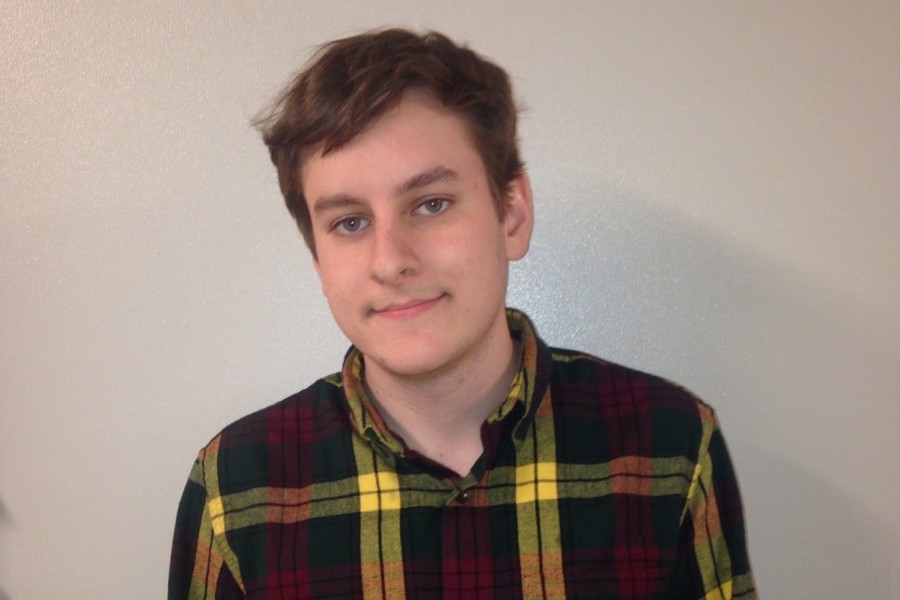
Charles P. Pierce writes eloquent pieces of journalism published in some of the most prominent news sources. But his career began in a much humbler setting: sitting with a typewriter in the basement of Johnston Hall.
Like so many Marquette students who came before and after, Pierce lived in a pie-shaped room in McCormick. He watched as Al McGuire’s basketball team won the NCAA National Championship in 1977, and he graduated a Marquette Warrior.
“I almost got killed writing for the Marquette Tribune,” Pierce said.
He remembered an infamous story from his time working on the Tribune staff in Johnston. “I will never forget, one day (a work crew) was working on the first floor while we were working in the basement,” Pierce said.
“I pulled away from my typewriter and heard this enormous crash. I turned around, and a giant piece of cinder block had come down and just destroyed the typewriter. I was stunned. Then this guy’s head came through the hole in the floor upside-down and just said, ‘Uh, sorry, man!’”
Pierce escaped the perils of crumbling campus buildings. He even survived the celebrations when Marquette entered the NCAA’s Final Four, when he and his friends discovered “you cannot make a Coke machine float.”
Pierce left Marquette relatively unscathed. He has since written four books, become a regular panelist on the popular NPR show “Wait, Wait … Don’t Tell Me!” and published works in the New York Times Magazine, the Atlantic, the Nation, the Boston Globe, the Chicago Tribune and Slate, among others.
His writing is imbued with an often dark sense of humor, an unabashed point of view and a poetic journalistic style. He has written about sports, politics and issues of religion – three topics that show he is not scared of a fight. He also branches off from usual topics, exploring subjects from Alzheimer’s disease to the fate of the racing horse Seattle Slew.
“I even once wrote 1,000 words about raccoons,” Pierce said. “But around the same time, I was also covering the 1980 presidential election.”
Pierce credits his mentor George Reedy, former White House Press Secretary and the dean of Marquette’s journalism school when Pierce was a student, with inspiring him to write about anything he found truly interesting no matter the subject matter.
“I learned more sitting talking to George than I did anywhere else ever,” Pierce said. “He taught me that the worst thing that can happen in this business is that you lose your curiosity. So there is very little in the world that I don’t like to write about.”
His most recent bestselling book “Idiot America: How Stupidity Became a Virtue in the Land of the Free” tackles issues that have to do with a lack of curiosity in the American media and society. In his view, journalism is lacking common sense and often unnecessarily gives two sides of an argument equal weight out of a desire to be objective.
“There are two sides to every story. They’re not both correct, and that’s a conundrum that the traditional mainstream media has never solved,” Pierce said. “I don’t care how high the polling for anti-gravity is; you can’t flap your arms and fly to the moon.”
Tonight, Pierce returns to Milwaukee to the Riverside Theatre for a live taping of “Wait, Wait … Don’t Tell Me!”
Pierce has been a panelist on the NPR quiz show since its beginnings in Chicago in 1997. Comedian Peter Segal hosts the show along with judge, official scorekeeper and venerable NPR newsman Carl Kasell. Each radio hour brings levity and antics that might be more fitting for “The Daily Show” than stations that also run serious-minded news programs like “Morning Edition” and “All Things Considered.”
“I tell people that if I could just do ‘Wait, Wait … Don’t Tell Me!’ for a living, I would,” Pierce said. “It’s that much fun.”
On the show, callers from home play different news-related games like “Who’s Carl This Time?” in which the stately voice of the announcer reads ridiculous or memorable quotes from that week’s news.
Every show also has celebrity guest call in to to play “Not My Job,” a game when celebrities are quizzed on subjects a world apart from their area of expertise. In the past, they have asked Tom Hanks – known as the nicest man in Hollywood – about notoriously difficult leading men, and they’ve questioned butter-loving chef Paula Deen about tofu.
The prize for every game is the charmingly simple reward of getting “Carl’s voice on your home answering machine.”
In addition to Pierce, regular panelists on the show include Paula Poundstone, P.J. O’Rourke, Mo Rocca and a rotation of other writers and comedians. As one of the original panelists, Pierce has seen the show grow from obscurity into one of the organization’s most popular.
“We launched the show a week after the Monica Lewinsky scandal broke,” Pierce said. “So we were born under a lucky star for a news quiz program.”
At first, the show’s cast did not have instant chemistry. The producers of “Wait, Wait” eventually replaced the original host with Peter Segal and added satirist Adam Felber.
“As soon as Peter got in there, we got an entirely different show and we took off,” Pierce said.
Within years, “Wait, Wait” has become one of the most popular syndicated NPR programs and one of the most downloaded podcasts on iTunes.
While the show is about an hour long on air, the tapings often last much longer and are filled with content the radio listeners never hear.
“The taping is usually about two hours long, and then the genius crew in Chicago cuts it down to about an hour of coherent radio,” Pierce said. “I’ve always been saying that we should put an outtake CD together because a lot of the really good stuff does not make the radio.”
Though Pierce has gone on to find a career full of humor, success and a search for knowledge, he always remembers his beginnings at Marquette. When he returns to visit his college-home for the show, he plans to tour the office where he was nearly obliterated by cinder blocks and reminisce about Marquette times gone by.
“(Your time at college) is the only time in your life – unless you get very, very wealthy and very, very lucky – where you’re going to have a chance to learn stuff you don’t have to know,” Pierce said. “If all you know is stuff you have to know, your life isn’t going to be as full and you’re not going to be as happy.”
Pierce has taken that lesson to heart in his own career. He searches for the odd, the interesting and the important, never losing his curiosity in the process.





Colleen Riehl • Nov 19, 2012 at 3:37 pm
Love that show…good column, Erin.
kesslerkate • Nov 15, 2012 at 6:56 pm
Great article about one of my favorite NPR shows…..so fun to know there is a Marquette connection.